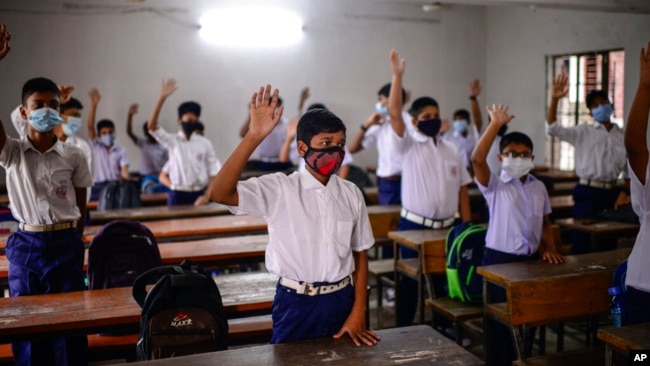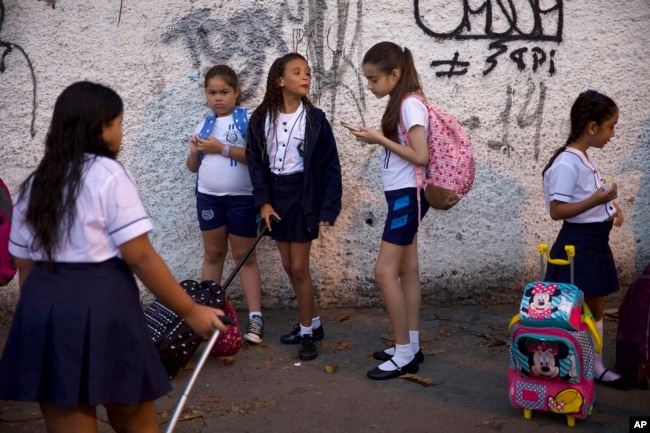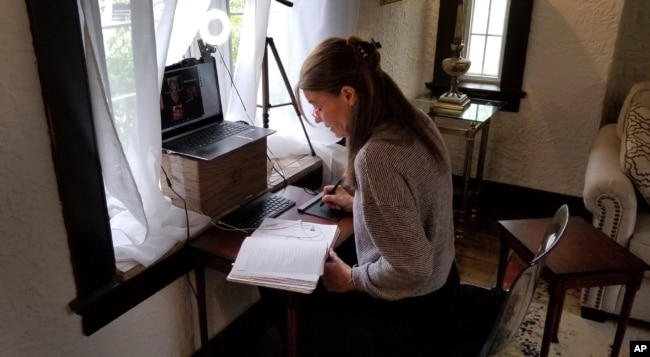世界の若者への調査結果ー彼らの不安
教育、雇用、民主主義への不安、本当にそうですね!!!
世界の全世代が、そう感じていると思います。
未来を示す政治は、今の若者のためのものでなくてはならないと思います。
当選することを主眼におけば、多くの票を有する有権者層へのアピールとなるのでしょう。理念が通らない未熟な政治体制を打破する手立てはないものでしょうか。やはり首相を一人一人の投票で決める!!以外ないのではないでしょうか!!
VOAで英語を学び、一緒に考えましょう!!
調査結果 :若者は教育、雇用、民主主義に不安を抱いている(和訳)
Study: Young People Worried about Education, Employment, Democracy
世界中の若者が、政治や教育のあり方について真剣に悩んでいます。その情報は、経済協力開発機構(OECD)の調査から得たものです。
この調査は、72カ国 151の若者団体を調査したものです。調査対象は15歳から29歳の若者です。
研究者は、この年代の人々は、2008年の金融崩壊とコロナウイルスの大流行という2つの世界的な危機を経験していると指摘しています。OECDの研究者は、パンデミックの若年層への影響を知ることは重要であるとしています。パンデミックは、”異なる年齢層に異なる影響を与え、...その反響は、今後数十年にわたり多くの人々に感じられるだろう...”と彼らは述べています。
青少年団体には、COVID-19の影響に対処するために青少年が最も困難と感じている3つの分野を挙げてもらいました。その結果、心の健康、教育、雇用が上位を占めました。その他の分野では、個人的な人間関係、個人の富、個人の自由の制限が懸念されました。
研究者は、パンデミックの教育への長期的な影響について、"まだ十分に観察されていない "と述べています。この危機は、”国際的な学生の移動性を大きく低下させ”、異なる集団間の教育格差を広げ、学生が教育を終了するリスクを増加させたと付け加えています。
今年発表されたOECDの調査によると、2020年にはOECD加盟国の15歳から19歳の平均6%が雇用、教育、職業訓練に携わっていないことが判明しました。
コロンビアやブラジルなどの貧しい国々では、少なくとも20パーセントの若者が雇用、教育、職業訓練に携わっていないことがわかりました。
危機の影響は、”若い女性、社会経済的に不利な立場にある若者、雇用や教育、職業訓練を受けていない若者...その他、弱い立場にある若者”にとってより深刻であると、同研究は述べています。
いくつかの国は、教育支出を増やし、弱い立場の人々の生活を改善しようと努めています。
例えばカナダ政府は、先住民のグループが中等教育課程を修了するのを支援するための資金を提供しました。また、男女間の賃金差を縮めるために、若い女性への育児支援を強化しました。
スウェーデンは、高等教育で学ぶ若い移民が卒業後に仕事を見つけなければならない期間を6カ月から12カ月に延長しました。そこでは、移民が居住権を得るためには、卒業と同時に職を持つことが要求されます。
フランス、ベルギー、エストニアは、教育や労働力から外れた若者が新たなスキルを身につけるための新しいプログラムやトレーニングを開始しました。全体として、研究者が調査したOECD加盟国32カ国のうち、復興計画の一環として若者を対象としていないのは、アイスランド、日本、ルクセンブルグの3カ国だけでした。
このような取り組みを行っても、パンデミック開始以来、若者の政府に対する信頼は低下しています。調査に参加したすべての国のうち、37%の若者団体が政府への信頼が低下していると回答しています。また、医療、住宅、教育などの行政サービスに対する支持率も低いと報告されています。また、調査対象となった若者団体の34%が、民主主義への満足度が低くなっていると回答しています。
多くの国が、復興策の立案において若者団体と連携することで、若者との信頼関係を築こうと考ました。オーストラリアは、政府の予算目標についてコメントするよう若者団体を招待しました。エストニアは、復興計画策定における重要なパートナーとして、全国青年協議会を挙げました。メキシコは、教育、雇用、健康、暴力などの問題に ついて2万人の若者市民に質問し、政策に反映させました。
研究者は、「政府が積極的にコミュニケーションをとることで、若者を含む市民の賛同と関与を得ることができる」と述べています。
Study: Young People Worried about Education, Employment, Democracy
Young people all over the world are seriously concerned about the state of politics and education. That information comes from a survey by the Organization for Economic Cooperation and Development, or OECD.
The study looked at 151 youth organizations from 72 countries. It centered on young people aged 15 to 29.
The researchers noted that people between those ages have lived through two worldwide crises — the 2008 financial collapse and the coronavirus pandemic. OECD researchers say it is important to learn the effects of the pandemic on younger people. The pandemic, they said, has “affected different age groups differently and…its repercussions will be felt by many for decades to come…”
Youth organizations were asked to identify three areas in which young people were finding it most difficult to deal with the effects of COVID-19. The top answers were mental health, education and employment. Other areas of concern were personal relationships, personal wealth and limits on individual freedom.
The researchers said the pandemic’s long-term effects on education “remain to be fully observed.” The study added that the crisis has greatly “reduced international student mobility,” widened educational differences across different populations and increased the risk of students ending their education.
An OECD study released this year found that, on average, 6 percent of 15- to 19-year-olds in OECD countries were not involved in employment, education or job training in 2020.
In poorer countries like Colombia and Brazil, at least 20 percent of young people were not involved in employment, education or training.
The effects of the crisis have been more severe, the study said, for “young women, young people from socio-economically disadvantaged backgrounds, young people not in employment, education or training … and other young people in vulnerable circumstances,” the study said.
Several countries have increased educational spending and sought to improve the lives of vulnerable groups.
Canada’s government, for example, provided money to help native groups complete secondary school. The country also introduced more childcare support for young women in an effort to close the wage difference between men and women.
Sweden extended the time for which young immigrants studying in upper secondary education must find a job after graduation from 6 to 12 months. There, immigrants are required to have a job upon graduation to get residency.
France, Belgium and Estonia have started new programs and trainings for young people out of education and the workforce to build new skills. Overall, just three out of 32 OECD member countries studied by the researchers — Iceland, Japan and Luxembourg — did not target young people as part of their recovery plans.
Even with such efforts, young people’s trust in government has decreased since the pandemic started. Of all countries taking part in the study, 37 percent of youth organizations say their trust in government has decreased. They also reported low levels of approval for government services like healthcare, housing and education. Thirty-four percent of youth organizations surveyed also say they are less satisfied with democracy.
Many countries looked to build trust with young people by partnering with youth organizations in planning recovery measures. Australia invited youth organizations to comment on the government’s budget goals. Estonia listed the National Youth Council as an important partner in the creation of its recovery plan. Mexico questioned 20,000 of its young citizens on issues like education, employment, health and violence to inform policy measures.
When “governments communicate proactively,” the researchers said, “they can generate citizen buy-in and engagement, including among young people.”
Words in This Story
survey — n. an activity in which many people are asked a question or a series of questions in order to gather information about what most people do or think about something
youth— n. young people
repercussion — n. something usually bad or unpleasant that happens as a result of an action, statement, etc., and that usually affects people for a long time
mobility — n. the ability or tendency to move from one position or situation to another usually better one
disadvantage — n. something that makes someone or something worse or less likely to succeed than others
vulnerable — adj. easily hurt or harmed physically, mentally, or emotionally
circumstance — n. a condition or fact that affects a situation
resident — n. someone who lives in a particular place
proactive — adj. controlling a situation by making things happen or by preparing for possible future problems
engagement — n. the act or state of being involved with something


